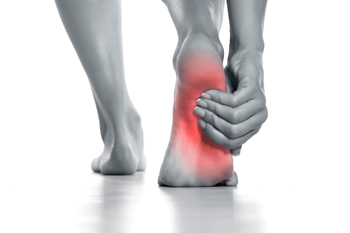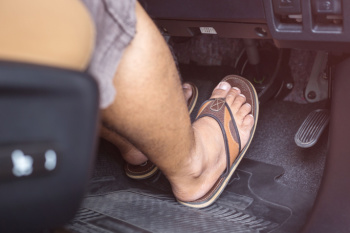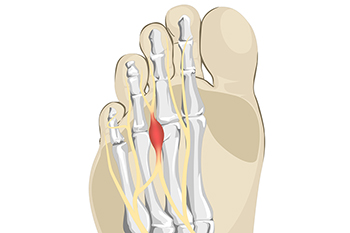Items filtered by date: September 2024
Football Players and Ankle Injuries

Football players are at high risk for ankle injuries due to the sport's physical demands, including rapid direction changes, running, and jumping. Sprains are one of the most common ankle injuries, particularly among running backs and receivers. These sprains often occur when the ankle is twisted or stepped on during play, causing damage to ligaments. High ankle sprains, which involve the ligaments above the ankle, are more severe and take longer to heal than lower ankle sprains. If not treated properly, ankle injuries can lead to long-term problems like chronic instability and pain. This may impact a player's performance and ability to participate in future games. A podiatrist can help by diagnosing the injury, recommending proper treatment, and suggesting ways to prevent future injuries through bracing or rehabilitation exercises. If you have an ankle injury as a result of playing football, it is suggested that you make an appointment with a podiatrist.
Sports related foot and ankle injuries require proper treatment before players can go back to their regular routines. For more information, contact one of our podiatrists of Pennsylvania. Our doctors can provide the care you need to keep you pain-free and on your feet.
Sports Related Foot and Ankle Injuries
Foot and ankle injuries are a common occurrence when it comes to athletes of any sport. While many athletes dismiss the initial aches and pains, the truth is that ignoring potential foot and ankle injuries can lead to serious problems. As athletes continue to place pressure and strain the area further, a mild injury can turn into something as serious as a rupture and may lead to a permanent disability. There are many factors that contribute to sports related foot and ankle injuries, which include failure to warm up properly, not providing support or wearing bad footwear. Common injuries and conditions athletes face, including:
- Plantar Fasciitis
- Plantar Fasciosis
- Achilles Tendinitis
- Achilles Tendon Rupture
- Ankle Sprains
Sports related injuries are commonly treated using the RICE method. This includes rest, applying ice to the injured area, compression and elevating the ankle. More serious sprains and injuries may require surgery, which could include arthroscopic and reconstructive surgery. Rehabilitation and therapy may also be required in order to get any recovering athlete to become fully functional again. Any unusual aches and pains an athlete sustains must be evaluated by a licensed, reputable medical professional.
If you have any questions please feel free to contact one of our offices located in Plymouth Meeting and Ambler, PA . We offer the newest diagnostic and treatment technologies for all your foot and ankle needs.
Why Your Feet May Suddenly Hurt While Walking

Experiencing sudden foot pain while walking can be troubling and may result from several common conditions. Plantar fasciitis, one major cause, is characterized by inflammation of the plantar fascia, which leads to sharp heel pain, especially with the first steps in the morning. Calluses, which develop from repeated friction and pressure, can become painful and affect how you walk. Metatarsalgia, or pain in the ball of the foot, often results from excessive pressure on the metatarsal bones and can be worsened by high-impact activities or ill-fitting shoes. Additionally, Morton’s neuroma, caused by a thickening of the nerve tissue between the toes, can lead to burning pain and tingling sensations. If you have pain while walking, your daily activities are likely to be disrupted. It is suggested that you promptly consult a podiatrist who can offer you effective relief and treatment methods.
Foot Pain
Foot pain can be extremely painful and debilitating. If you have a foot pain, consult with one of our podiatrists from Pennsylvania. Our doctors will assess your condition and provide you with quality foot and ankle treatment.
Causes
Foot pain is a very broad condition that could be caused by one or more ailments. The most common include:
- Bunions
- Hammertoes
- Plantar Fasciitis
- Bone Spurs
- Corns
- Tarsal Tunnel Syndrome
- Ingrown Toenails
- Arthritis (such as Gout, Rheumatoid, and Osteoarthritis)
- Flat Feet
- Injury (from stress fractures, broken toe, foot, ankle, Achilles tendon ruptures, and sprains)
- And more
Diagnosis
To figure out the cause of foot pain, podiatrists utilize several different methods. This can range from simple visual inspections and sensation tests to X-rays and MRI scans. Prior medical history, family medical history, and any recent physical traumatic events will all be taken into consideration for a proper diagnosis.
Treatment
Treatment depends upon the cause of the foot pain. Whether it is resting, staying off the foot, or having surgery; podiatrists have a number of treatment options available for foot pain.
If you have any questions, please feel free to contact one of our offices located in Plymouth Meeting and Ambler, PA . We offer the newest diagnostic and treatment technologies for all your foot care needs.
Foot Pain from Driving in Flip-Flops

Driving in flip-flops can lead to various types of foot pain and discomfort. The flimsy, open design of flip-flops offers little support or stability, causing the foot to shift and slide on the pedal. This instability can strain the muscles and tendons in the foot, leading to soreness or even injury. The lack of cushioning and shock absorption in flip-flops may exacerbate pressure on the feet during long drives, resulting in discomfort or pain. Additionally, frequent friction between the flip-flop and the foot can contribute to blisters and calluses. To avoid these issues, it is advisable to wear supportive, closed-toe shoes while driving. Wearing proper footwear ensures better control of the vehicle and helps prevent foot pain associated with inadequate support and protection. If you have developed foot discomfort from wearing flip-flops while driving or completing daily activities, it is suggested that you consult a podiatrist who can treat foot pain, and guide you on wearing more appropriate shoes.
Flip-flops are not always the best choice of footwear. If you have any concerns about your feet or ankles, contact one of our podiatrists from Pennsylvania. Our doctors will assist you with all of your foot and ankle needs.
Flip-Flops and Feet
When the weather starts warming up, people enjoy wearing flip-flops. Flip-flops are comfortable, stylish, and easy to slip on and off; they're perfect for any summer beach goer. However, these shoes can cause harm to the feet.
How Can Flip-Flops Affect Me Long-Term?
- Ankle problems
- Hip problems
- Lower back problems
- Pain in the balls of the feet
- Problems with foot arches
- Changes in the way you walk
Are There Injuries Associated with Flip-Flops?
Yes. Since flip-flops are relatively weak and do not provide the same amount of support as sneakers, people who wear flip-flops regularly are more susceptible to injuries. On top of that, the open nature of the shoe makes your feet more prone to other problems, such as cuts and even infections. Common injuries and ailments include:
- Sprained ankles
- Blisters
- Infections
- Cuts and Scrapes
I like Wearing Flip-Flops. Are There Safe Alternatives?
When buying flip-flops, try to find ones that have sturdy soles and that are made of high-quality materials that will support for your feet. These flip-flops will cost more but will also last longer as a result.
If you have any questions please feel free to contact one of our offices located in Plymouth Meeting and Ambler, PA . We offer the newest diagnostic and treatment technologies for all your foot and ankle needs.
Arthritis Can Cause Pain in the Feet and Ankles
Morton’s Neuroma Remedies

Morton's neuroma is a painful foot condition, where a nerve between the toes becomes thickened and inflamed. Morton’s neuroma often causes a burning sensation, tingling, or a feeling of a lump in the ball of the foot. This condition is commonly triggered by wearing tight shoes or high heels or by repetitive stress on the foot. Initial treatment focuses on relieving pressure on the nerve by switching to wider, more supportive footwear and using orthotic inserts to distribute pressure more evenly. Taking anti-inflammatory medication can help manage pain and inflammation. For persistent cases, corticosteroid injections or exercises may be recommended to reduce symptoms. In severe situations, surgical options might be considered to remove the affected nerve. If you suspect you have Morton's neuroma or are struggling with persistent foot pain, it is suggested that you make an appointment with a podiatrist who can provide specialized treatment tailored to your needs.
Morton’s neuroma is a very uncomfortable condition to live with. If you think you have Morton’s neuroma, contact one of our podiatrists of Pennsylvania. Our doctors will attend to all of your foot care needs and answer any of your related questions.
Morton’s Neuroma
Morton's neuroma is a painful foot condition that commonly affects the areas between the second and third or third and fourth toe, although other areas of the foot are also susceptible. Morton’s neuroma is caused by an inflamed nerve in the foot that is being squeezed and aggravated by surrounding bones.
What Increases the Chances of Having Morton’s Neuroma?
- Ill-fitting high heels or shoes that add pressure to the toe or foot
- Jogging, running or any sport that involves constant impact to the foot
- Flat feet, bunions, and any other foot deformities
Morton’s neuroma is a very treatable condition. Orthotics and shoe inserts can often be used to alleviate the pain on the forefront of the feet. In more severe cases, corticosteroids can also be prescribed. In order to figure out the best treatment for your neuroma, it’s recommended to seek the care of a podiatrist who can diagnose your condition and provide different treatment options.
If you have any questions, please feel free to contact one of our offices located in Plymouth Meeting and Ambler, PA . We offer the newest diagnostic and treatment technologies for all your foot care needs.

